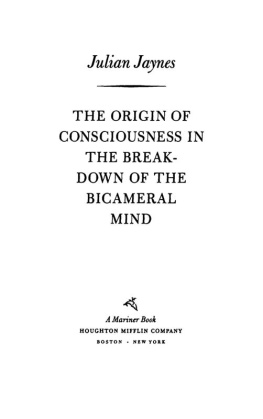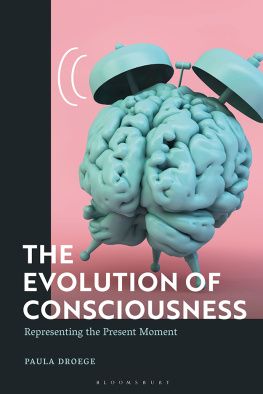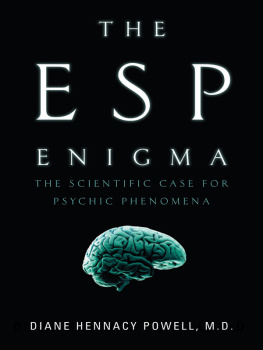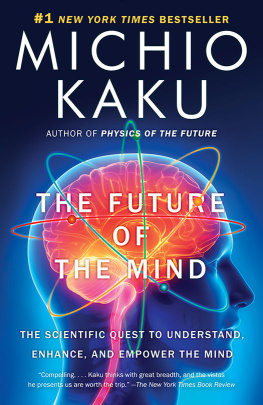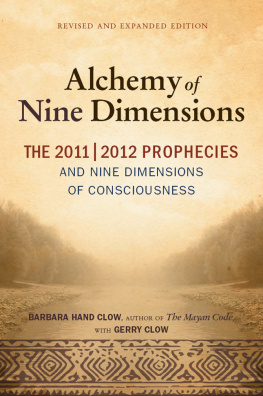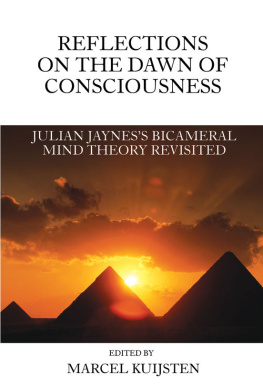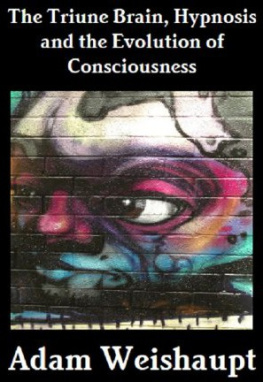First Manner Books edition 2000
Copyright 1976, 1990 by Julian Jaynes
All rights reserved.
For information about permission to reproduce selections from this book, write to Permissions, Houghton Mifflin Company, 215 Park Avenue South, New York, New York 10003.
Visit our Web site: www.hmco.com/trade.
The Library of Congress has cataloged the print edition as follows:
Jaynes, Julian.
The origin of consciousness in the breakdown of the
bicameral mind.
Includes bibliographical references and index.
1. Consciousness. 2. ConsciousnessHistory. I. Title.
BF 311.J36 128'.2 76-28748
ISBN 0-618-05707-2 (pbk.)
eISBN 978-0-547-52754-3
v1.0912
See last page of book for credits.
Preface
T HE CENTRAL ideas of this inquiry were first summarized publicly in an Invited Address to the American Psychological Association in Washington in September 1969. Since then, I have been something of an itinerant lecturer, various parts of this work having been given at colloquia and lectures at various places. The resulting attention and discussion have been very helpful.
Book I presents these ideas as I arrived at them.
Book II examines the historical evidence.
Book III makes deductions to explain some modern phenomena.
Originally, I had planned Books IV and V to complete the central positions of the theory. These will now become a separate volume, whose working title is The Consequences of Consciousness, not yet scheduled for publication.
PRINCETON UNIVERSITY , 1982
Introduction
The Problem of Consciousness
O, WHAT A WORLD of unseen visions and heard silences, this insubstantial country of the mind! What ineffable essences, these touchless rememberings and unshowable reveries! And the privacy of it all! A secret theater of speechless monologue and prevenient counsel, an invisible mansion of all moods, musings, and mysteries, an infinite resort of disappointments and discoveries. A whole kingdom where each of us reigns reclusively alone, questioning what we will, commanding what we can. A hidden hermitage where we may study out the troubled book of what we have done and yet may do. An introcosm that is more myself than anything I can find in a mirror. This consciousness that is myself of selves, that is everything, and yet nothing at allwhat is it?
And where did it come from?
And why?
Few questions have endured longer or traversed a more perplexing history than this, the problem of consciousness and its place in nature. Despite centuries of pondering and experiment, of trying to get together two supposed entities called mind and matter in one age, subject and object in another, or soul and body in still others, despite endless discoursing on the streams, states, or contents of consciousness, of distinguishing terms like intuitions, sense data, the given, raw feels, the sensa, presentations and representations, the sensations, images, and affections of structuralist introspections, the evidential data of the scientific positivist, phenomenological fields, the apparitions of Hobbes, the phenomena of Kant, the appearances of the idealist, the elements of Mach, the phanera of Peirce, or the category errors of Ryle, inspite of all of these, the problem of consciousness is still with us. Something about it keeps returning, not taking a solution.
It is the difference that will not go away, the difference between what others see of us and our sense of our inner selves and the deep feelings that sustain it. The difference between the you-and-me of the shared behavioral world and the unlocatable location of things thought about. Our reflections and dreams, and the imaginary conversations we have with others, in which never-to-be-known-by-anyone we excuse, defend, proclaim our hopes and regrets, our futures and our pasts, all this thick fabric of fancy is so absolutely different from handable, standable, kickable reality with its trees, grass, tables, oceans, hands, starseven brains! How is this possible? How do these ephemeral existences of our lonely experience fit into the ordered array of nature that somehow surrounds and engulfs this core of knowing?
Men have been conscious of the problem of consciousness almost since consciousness began. And each age has described consciousness in terms of its own theme and concerns. In the golden age of Greece, when men traveled about in freedom while slaves did the work, consciousness was as free as that. Heraclitus, in particular, called it an enormous space whose boundaries, even by traveling along every path, could never be found out. Note how the metaphors of mind are the world it perceives.
The first half of the nineteenth century was the age of the great geological discoveries in which the record of the past was written in layers of the earth's crust. And this led to the popularization of the idea of consciousness as being in layers which recorded the past of the individual, there being deeper and deeper layers until the record could no longer be read. This emphasis on the unconscious grew until by 1875 most psychologists were insisting that consciousness was but a small part of mental life, and that unconscious sensations, unconscious ideas, and unconscious judgments made up the majority of mental processes.
In the middle of the nineteenth century chemistry succeeded geology as the fashionable science, and consciousness from James Mill to Wundt and his students, such as Titchener, was the compound structure that could be analyzed in the laboratory into precise elements of sensations and feelings.
And as steam locomotives chugged their way into the pattern of everyday life toward the end of the nineteenth century, so they too worked their way into the consciousness of consciousness, the subconscious becoming a boiler of straining energy which demanded manifest outlets and when repressed pushed up and out into neurotic behavior and the spinning camouflaged fulfillments of going-nowhere dreams.
There is not much we can do about such metaphors except to state that that is precisely what they are.
Now originally, this search into the nature of consciousness was known as the mind-body problem, heavy with its ponderous philosophical solutions. But since the theory of evolution, it has bared itself into a more scientific question. It has become the problem of the origin of mind, or, more specifically, the origin of consciousness in evolution. Where can this subjective experience which we introspect upon, this constant companion of hosts of associations, hopes, fears, affections, knowledges, colors, smells, toothaches, thrills, tickles, pleasures, distresses, and desireswhere and how in evolution could all this wonderful tapestry of inner experience have evolved? How can we derive this inwardness out of mere matter? And if so, when?
This problem has been at the very center of the thinking of the twentieth century. And it will be worthwhile here to briefly look at some of the solutions that have been proposed. I shall mention the eight that I think are most important.
Consciousness as a Property of Matter
The most extensive possible solution is attractive mostly to physicists. It states that the succession of subjective states that we feel in introspection has a continuity that stretches all the way back through phylogenetic evolution and beyond into a fundamental property of interacting matter. The relationship of consciousness to what we are conscious of is not fundamentally different from the relationship of a tree to the ground in which it is rooted, or even of the gravitational relationship between two celestial bodies. This view was conspicuous in the first quarter of this century. What Alexander called compresence or Whitehead called prehension provided the groundwork of a monism that moved on into a flourishing school called Neo-Realism. If a piece of chalk is dropped on the lecture table, that interaction of chalk and table is different only in complexity from the perceptions and knowledges that fill our minds. The chalk knows the table just as the table knows the chalk. That is why the chalk stops at the table.
Next page
